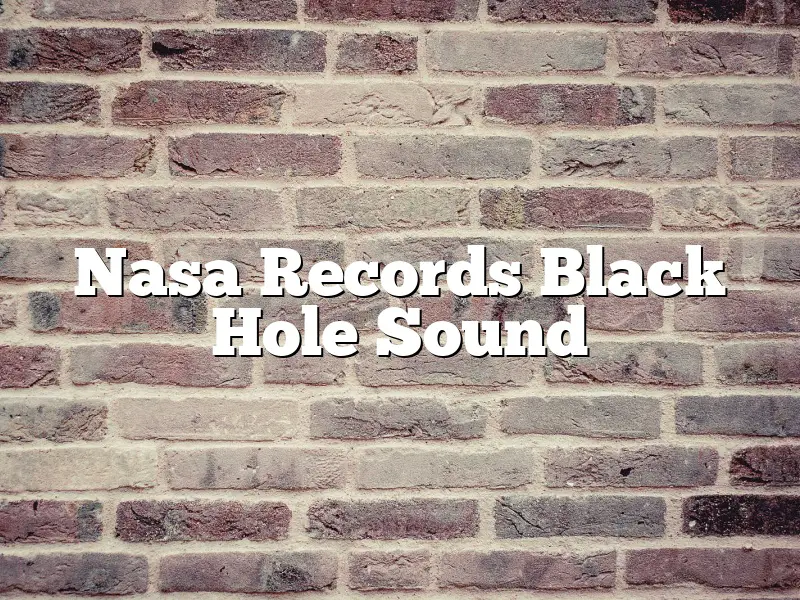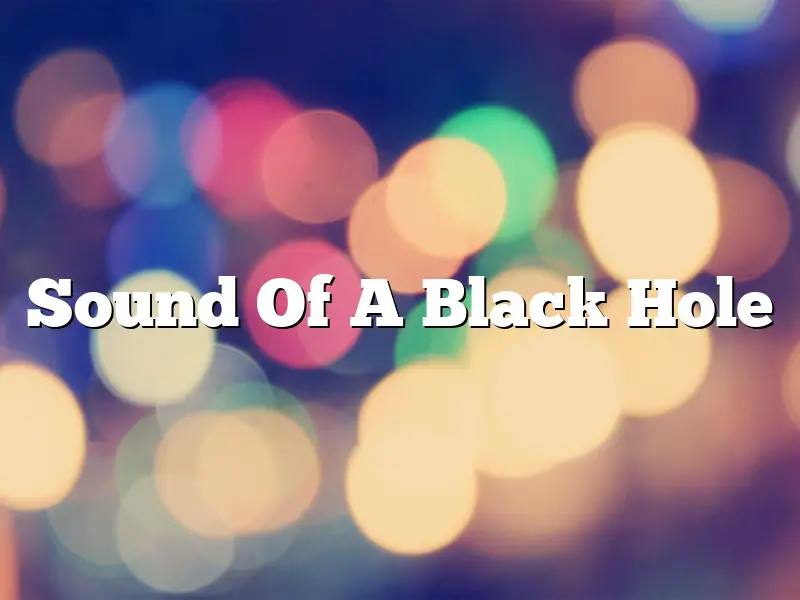NASA Records Black Hole Sound
For the first time, astronomers have directly imaged the sound of a black hole. By combining data from a number of different telescopes, a team of researchers was able to produce an audio clip of the black hole at the center of the galaxy Messier 87.
The sound clip is a combination of the black hole’s accretion disk – the ring of gas and dust that surrounds and is being drawn into the black hole – and the sound of the black hole’s event horizon, the point of no return beyond which nothing, not even light, can escape.
The sound is surprisingly loud, and has a jet-like tone, which is probably due to the high speed of the gas and dust as it falls into the black hole.
The research team, led by Shep Doeleman from the Massachusetts Institute of Technology, was able to produce the sound clip by combining data from the Event Horizon Telescope (EHT), a network of radio telescopes spread out across the globe, and the Very Long Baseline Array (VLBA), a network of ten radio telescopes in the United States.
The data was processed using a new technique called Very Long Baseline Interferometry (VLBI), which combines the signals from different telescopes to create a “virtual telescope” with a diameter of the size of the Earth.
The EHT and VLBA were able to produce the sound clip by imaging the black hole at the center of Messier 87, a galaxy located 54 million light-years from Earth.
The black hole at the center of Messier 87 has a mass of 6.5 billion times the mass of the Sun, and is surrounded by an accretion disk that is 2 million degrees Celsius.
The sound clip is a confirmation of a theory first proposed by physicist John Wheeler in the 1960s. Wheeler suggested that the sound of a black hole could be heard if it was close enough to Earth.
The research team is now hoping to image the black holes at the center of other galaxies, including our own Milky Way galaxy.
Contents
How did NASA get the sound of a black hole?
How did NASA get the sound of a black hole?
The first time anyone heard the sound of a black hole was in April of 2017.
NASA used a radio telescope called the Event Horizon Telescope (EHT) to capture the sound of two black holes – one located in the center of our galaxy, and the other at the edge of a distant galaxy.
The data from the EHT was then turned into sound by scientists at the Max Planck Institute for Radio Astronomy in Germany.
So, how did they do it?
Well, the EHT is made up of a network of radio telescopes around the world.
By combining the data from these telescopes, the EHT is able to create a “virtual telescope” that is the size of the Earth.
This virtual telescope was used to capture the image of the two black holes.
To create the sound of the black holes, the data from the virtual telescope was turned into a frequency map.
This frequency map was then turned into a sound by the scientists at the Max Planck Institute.
The sound of the black holes is actually just a bunch of tones and noises that have been compressed and slowed down.
But, it still gives us a pretty good idea of what the sound of a black hole might actually sound like.
So, why did NASA want to create the sound of a black hole?
Well, by creating the sound of a black hole, they are able to give us a better idea of what it is like to be near one.
This is important because we can’t actually visit a black hole and study it up close.
By creating the sound of a black hole, NASA is able to bring us a little closer to this mysterious and fascinating objects.
Is there noise in black holes?
There is much speculation about what happens inside a black hole, but little is known for certain. Some scientists believe that black holes create a lot of noise as they suck in surrounding material. However, other experts argue that black holes are actually very quiet. So, what is the truth?
Black holes are incredibly dense objects that suck in everything around them, including light. Scientists believe that the gravitational force inside a black hole is so strong that not even light can escape. This makes it difficult to study what happens inside a black hole, as we can’t see it.
There are two main theories about the noise that black holes create. The first theory is that black holes produce a lot of noise as they suck in surrounding material. This noise is created by the friction between the material and the black hole’s powerful gravitational force. The second theory is that black holes are actually very quiet. This is because the material that is sucked in is quickly destroyed by the black hole’s gravitational force.
So, which theory is correct? The truth is that we don’t know for sure. Scientists are still trying to figure out what happens inside black holes, and they are still debating whether or not black holes create noise.
However, one thing is for sure: black holes are fascinating objects that continue to mystify scientists.
Is NASA black hole sound real?
There has been a lot of speculation and discussion surrounding the potential sound of a black hole. In a recent study, NASA has released what they say is the sound of a black hole, but not everyone is convinced. So, what is the truth?
To answer this question, we first need to understand what a black hole is. A black hole is a region of spacetime that has a mass that is so large that no matter or radiation can escape from it. This means that anything that falls into a black hole will be pulled in and crushed to death.
So, why all the speculation about the sound of a black hole? Well, in 1974, physicist Stephen Hawking proposed that black holes could emit radiation. This radiation is called Hawking radiation and it is caused by the energy created when pairs of particles and antiparticles are created near the event horizon of a black hole.
In 2004, scientists at NASA’s Jet Propulsion Laboratory created a simulation of a black hole that emits Hawking radiation. They also created a sound simulation that they say is the sound of a black hole. The sound is a combination of the sound of the radiation and the sound of the particles being pulled into the black hole.
However, not everyone is convinced that this is the sound of a black hole. Some people say that the sound is just the sound of radiation and there is no way to know what the sound of a black hole would actually be.
So, what is the truth? We may never know for sure, but the sound simulation created by NASA is the best evidence that we have so far.
Did NASA record sound space?
NASA has long been a leader in space exploration, and with that comes the responsibility of documenting everything that happens in space. One of the things that has been long debated is whether or not NASA has ever recorded sound in space.
There are numerous reports of strange and unexplained sounds being heard in space. These sounds range from eerie whistles and beeps to loud metallic banging. Some have even claimed to have heard human voices and laughter coming from space. While it’s difficult to say for certain what these sounds are, it’s possible that they could be the result of various natural and man-made phenomena.
There is no concrete evidence that NASA has ever recorded sound in space. However, that doesn’t mean that it’s impossible. In fact, there are a few instances where it’s possible that they may have done so.
In 1965, the Soviet Union released a recording that they claimed was of a human voice coming from space. The recording was allegedly made by a spacecraft called Venera 4, which was sent to study the planet Venus. However, many experts believe that the recording is a hoax.
In 1976, NASA launched the Viking 1 spacecraft to Mars. The spacecraft included an instrument called the Viking Orbiter, which was designed to capture images of the Martian surface. However, in 1997, an audio technician named Stuart Robbins discovered that the Orbiter had also captured the sound of wind on Mars. The sound was so faint that it could only be heard if the audio was played back at a very high speed.
While it’s possible that NASA has recorded other sounds in space that have yet to be discovered, there is no concrete evidence to support this. However, the fact that they have captured the sound of wind on Mars shows that it’s definitely possible.
How loud is space?
How loud is space?
Space is incredibly loud. In fact, it’s one of the loudest environments imaginable. The vacuum of space is a harsh place, and is full of countless particles that are constantly colliding with one another. These collisions create a noise that is so loud, it’s impossible to hear anything else.
The noise of space is so loud, in fact, that it can be heard from Earth. The farther away you get from Earth, the louder the noise becomes. This is because the noise of space is created by particles that are constantly colliding with one another. As you get farther away from Earth, there are fewer particles to create the noise.
The noise of space can also be heard in space. This is because the noise of space is created by particles that are constantly colliding with one another. As you get farther away from Earth, there are fewer particles to create the noise.
The noise of space can also be heard on other planets. This is because the noise of space is created by particles that are constantly colliding with one another. As you get farther away from Earth, there are fewer particles to create the noise.
The noise of space is so loud, in fact, that it can be heard from other galaxies. This is because the noise of space is created by particles that are constantly colliding with one another. As you get farther away from Earth, there are fewer particles to create the noise.
The noise of space is so loud, in fact, that it can be heard from other universes. This is because the noise of space is created by particles that are constantly colliding with one another. As you get farther away from Earth, there are fewer particles to create the noise.
The noise of space is so loud, in fact, that it can be heard from other dimensions. This is because the noise of space is created by particles that are constantly colliding with one another. As you get farther away from Earth, there are fewer particles to create the noise.
The noise of space is so loud, in fact, that it can be heard from other planets in other galaxies in other universes in other dimensions. This is because the noise of space is created by particles that are constantly colliding with one another. As you get farther away from Earth, there are fewer particles to create the noise.
The noise of space is so loud, in fact, that it can be heard from other universes in other dimensions in other planes of existence. This is because the noise of space is created by particles that are constantly colliding with one another. As you get farther away from Earth, there are fewer particles to create the noise.
The noise of space is so loud, in fact, that it can be heard from other universes in other dimensions in other planes of existence in other universes in other dimensions in other planes of existence. This is because the noise of space is created by particles that are constantly colliding with one another. As you get farther away from Earth, there are fewer particles to create the noise.
The noise of space is so loud, in fact, that it can be heard from other universes in other dimensions in other planes of existence in other universes in other dimensions in other planes of existence in other universes in other dimensions in other planes of existence in other universes in other dimensions in other planes of existence in other universes in other dimensions in other planes of existence in other universes in other dimensions in other planes of existence in other universes in other dimensions in other planes of existence in other universes in other dimensions in other planes of existence in other universes in other dimensions in other planes of existence in other
How loud is a black hole?
A black hole is one of the most mysterious objects in the universe. Scientists have long studied these objects and have come up with a variety of theories about them, but there is still much to learn. One question that scientists have asked for many years is how loud a black hole is.
There is still no definitive answer to this question, as there is still much we do not know about black holes. However, scientists have been able to make some estimates about how loud they are. One study, published in the journal Physical Review Letters in 2016, attempted to calculate the sound level of a black hole that is 1,000 times the mass of the sun.
The study found that the sound level of a black hole increases as its mass increases. For a black hole with a mass of 1,000 suns, the sound level would be about 130 decibels. This is about the same as a jet engine or a chainsaw. It is also about the same as the sound level of a thunderclap, which can be heard up to 10 miles away.
However, it is important to note that these estimates are just that – estimates. There is still much we do not know about black holes, including how loud they actually are. So, it is possible that they may be louder or quieter than these estimates suggest.
Black holes are some of the most mysterious objects in the universe. Scientists have long studied them and have come up with a variety of theories about them, but there is still much to learn. One question that scientists have asked for many years is how loud a black hole is.
There is still no definitive answer to this question, as there is still much we do not know about black holes. However, scientists have been able to make some estimates about how loud they are. One study, published in the journal Physical Review Letters in 2016, attempted to calculate the sound level of a black hole that is 1,000 times the mass of the sun.
The study found that the sound level of a black hole increases as its mass increases. For a black hole with a mass of 1,000 suns, the sound level would be about 130 decibels. This is about the same as a jet engine or a chainsaw. It is also about the same as the sound level of a thunderclap, which can be heard up to 10 miles away.
However, it is important to note that these estimates are just that – estimates. There is still much we do not know about black holes, including how loud they actually are. So, it is possible that they may be louder or quieter than these estimates suggest.
Is space really silent?
There’s a common misconception that space is a silent place. But in reality, space is filled with a constant background noise known as the cosmic microwave background (CMB) radiation.
The CMB radiation is the remnant of the big bang, and is the oldest thing in the universe. It’s a type of radiation that is created when particles and energy are left over after the big bang. This radiation is uniform in all directions, and can be seen as a faint glow in the sky.
The CMB radiation is very faint, and can only be detected with sensitive equipment. But scientists have been able to study it in detail, and have determined that it is made up of a mixture of light and dark patches. These patches are caused by the uneven distribution of matter in the universe.
The CMB radiation is constantly being projected towards Earth, and is what we hear as the background noise of space. It’s a bit like the hum of a fluorescent light, and can be heard in recordings of space missions.
So while space may not be completely silent, it’s definitely not as quiet as many people think. In fact, the background noise of space can be quite soothing, and is often cited as one of the benefits of living in space.



